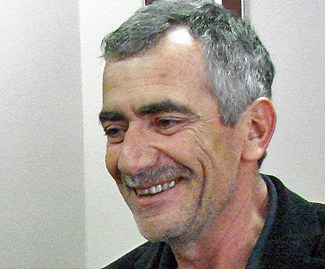
Las Cruces developer Philip Philippou (Photo by Heath Haussamen)
The City of Las Cruces and developer Philip Philippou have reached a tentative settlement to a lawsuit in which the city accused Philippou of failing to build millions of dollars of required infrastructure in his developments.
The monetary value of the subdivision requirements Philippou has not met is just under $3 million. The city had announced a partial settlement in August in which Philippou agreed to hand over $533,200 in land. The remainder of the settlement, which the city announced Tuesday, has Philippou handing over additional surface water rights, land, a right of way and engineering services.
“Throughout this entire negotiation, our number one concern was that of the public,” Mayor Ken Miyagishima said in a news release. “We wanted to ensure that their best interests were protected in our dealings with Mr. Philippou, and we’re confident that this settlement achieves that goal. It does so in part, by helping maintain property values.”
Among what Philippou is giving up is a right of way along Mesa Grande Drive from U.S. Highway 70 to Lohman Avenue. And, on top of the other land being handed over, the city “will obtain a security interest in additional Philippou-owned real estate worth a total value of $4,104,000 to guarantee performance and payment of all liabilities owed to the City,” the release states.
The city plans to use the assets Philippou is handing over “to complete improvements within subdivisions left unfinished by Philippou,” according to the release.
In addition to protecting the public, Miyagishima said the settlement “allows Mr. Philippou to proceed with developing nearly 600 lots” and will “help spark economic activity — contractors, subcontractors, construction workers, lenders, real estate agencies, building supply stores, etc. will all benefit from the result of this settlement.”
The city intends to develop a plan to take over completion of the improvements and operation and maintenance in the subdivisions in the next few weeks.
Years of complaints
Tuesday’s announcement is certain to be welcomed as good news by people who have been complaining for years about projects Philippou has left incomplete. For example, almost two years ago, a Philippou spokesman said he expected that drainage improvements in the Dos Sueños subdivision in northeast Las Cruces would be completed in 4-6 weeks. That still hasn’t happened.
The city stated in its 15-page complaint, filed in July, that Philippou had “failed to construct drainage infrastructure improvements” in the Dos Sueños subdivision and that the city, its citizens and others would “suffer irreparable injury unless injunctions are granted due to the fact that persons purchasing lots in this subdivision will be unprotected from the non-performance of Defendants and will be forced to live in lots lacking basic infrastructure or services.”
The complaint also detailed Philippou’s noncompliance with infrastructure requirements in several other Las Cruces subdivisions. In addition to drainage improvements, the issues identified included roadway and utility work and rock wall improvements.
The city has already taken steps to ensure nothing like this happens again. Because of a lack of city regulations at the time, Philippou was allowed to begin selling lots for development before completing neighborhood infrastructure. The city changed that policy two years ago.
Robert Garza, assistant city manager, pointed that out in Tuesday’s news release.
“Another direct and very significant public benefit resulting from this is that developers must now complete subdivision infrastructure requirements before they will be allowed to sell lots,” he said. “This practice will ensure that issues similar to the ones in the Philippou matter won’t ever arise in the future.”
Philippou’s history
The lawsuit was the latest trouble for Philippou, who is arguably one of the most controversial developers in the state. Philippou’s most visible controversy relates to his dealings with the State Land Office.
Pat Lyons, the state land commissioner, bypassed his own bidding process and agreed to lease thousands of acres of public land in Las Cruces to Philippou in 2006. Around the same time, Lyons received approximately $30,000 in campaign contributions from Philippou and a political committee and lobbyists tied to the developer.
It’s a land deal Attorney General Gary King has said is flawed. The AG’s formal opinion states that the lease agreement’s method of compensating Philippou’s company for developing the land is “not comprehended by and in conflict with” a statute that allows developers who improve land for the state to be compensated only for the appraised value of the improvements.
The controversy surrounding the land office helped fuel public outcry over the city’s growth policies and helped lead to the overthrowing of the city council in two elections held in late 2007 and early 2008.
